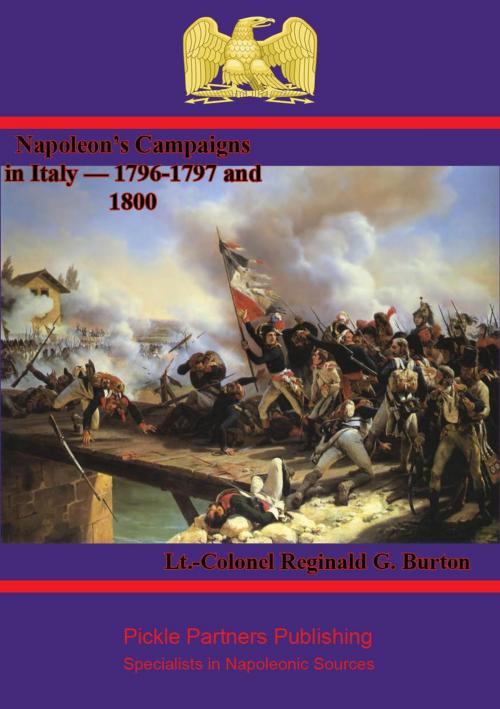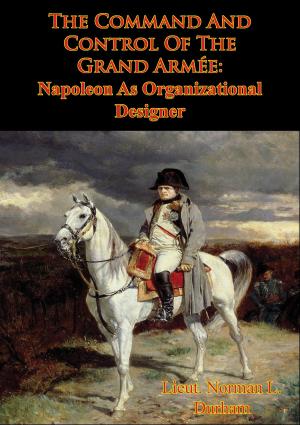Napoleon’s Campaigns in Italy — 1796-1797 and 1800
Nonfiction, History, Spain & Portugal, France, Military| Author: | Lt.-Colonel Reginald G. Burton | ISBN: | 9781908902351 |
| Publisher: | Wagram Press | Publication: | May 1, 2012 |
| Imprint: | Wagram Press | Language: | English |
| Author: | Lt.-Colonel Reginald G. Burton |
| ISBN: | 9781908902351 |
| Publisher: | Wagram Press |
| Publication: | May 1, 2012 |
| Imprint: | Wagram Press |
| Language: | English |
The immortal words “Not tonight Josephine!” are probably apocryphal, but in 1796 Napoleon had more pressing concerns than his amorous wife: he had been handed command of the Republican forces in Italy. His men were clothed in rags, unpaid, and hungry. Napoleon set to work with a passion, bending his senior commanders to his will (despite their seniority in both age and rank), raising morale and promising the troops what they craved—the opportunity for victory and loot!
Many historians regard Napoleon’s first campaign to be his finest, using all his genius to outmanoeuvre his numerous opponents, by dividing them, hard marching and even harder fighting to destroy Austrian power in Northern Italy. In his wake, his forces garnered so many victories, it is hard to disagree: Mondovi, Lodi, Lonato, Montenotte, Arcole, and finally Rivoli.
After an abortive expedition to Egypt, during which time the ruling powers in France had squandered their gains from previous engagement, Napoleon was appointed as head of state in the garb of First Consul. Using all of his powers of organization, he formulated a brilliant campaign plan to expel the ascendant Austrians from Italy: he swept through the Alps in the middle of winter behind the enemy forces. After a bloody engagement at Marengo, which hung in the balance until the arrival of French reinforcements, the Austrians were forced out of Italy and would sue for peace soon thereafter.
Another excellent volume in the Special Campaigns series produced around the turn of the 20th century by serving or recently retired British and Indian Army officers. Brig-Gen. Burton wrote a number of books on Napoleon’s campaigns for the series and was an acknowledged expert on the era, applying his expert eye to the lightning moves of the Emperor contrasted by the lumbering vacillations of his opponents.
Author — Brig.-General Reginald G. Burton (Indian Army) (1864-1923)
The immortal words “Not tonight Josephine!” are probably apocryphal, but in 1796 Napoleon had more pressing concerns than his amorous wife: he had been handed command of the Republican forces in Italy. His men were clothed in rags, unpaid, and hungry. Napoleon set to work with a passion, bending his senior commanders to his will (despite their seniority in both age and rank), raising morale and promising the troops what they craved—the opportunity for victory and loot!
Many historians regard Napoleon’s first campaign to be his finest, using all his genius to outmanoeuvre his numerous opponents, by dividing them, hard marching and even harder fighting to destroy Austrian power in Northern Italy. In his wake, his forces garnered so many victories, it is hard to disagree: Mondovi, Lodi, Lonato, Montenotte, Arcole, and finally Rivoli.
After an abortive expedition to Egypt, during which time the ruling powers in France had squandered their gains from previous engagement, Napoleon was appointed as head of state in the garb of First Consul. Using all of his powers of organization, he formulated a brilliant campaign plan to expel the ascendant Austrians from Italy: he swept through the Alps in the middle of winter behind the enemy forces. After a bloody engagement at Marengo, which hung in the balance until the arrival of French reinforcements, the Austrians were forced out of Italy and would sue for peace soon thereafter.
Another excellent volume in the Special Campaigns series produced around the turn of the 20th century by serving or recently retired British and Indian Army officers. Brig-Gen. Burton wrote a number of books on Napoleon’s campaigns for the series and was an acknowledged expert on the era, applying his expert eye to the lightning moves of the Emperor contrasted by the lumbering vacillations of his opponents.
Author — Brig.-General Reginald G. Burton (Indian Army) (1864-1923)















